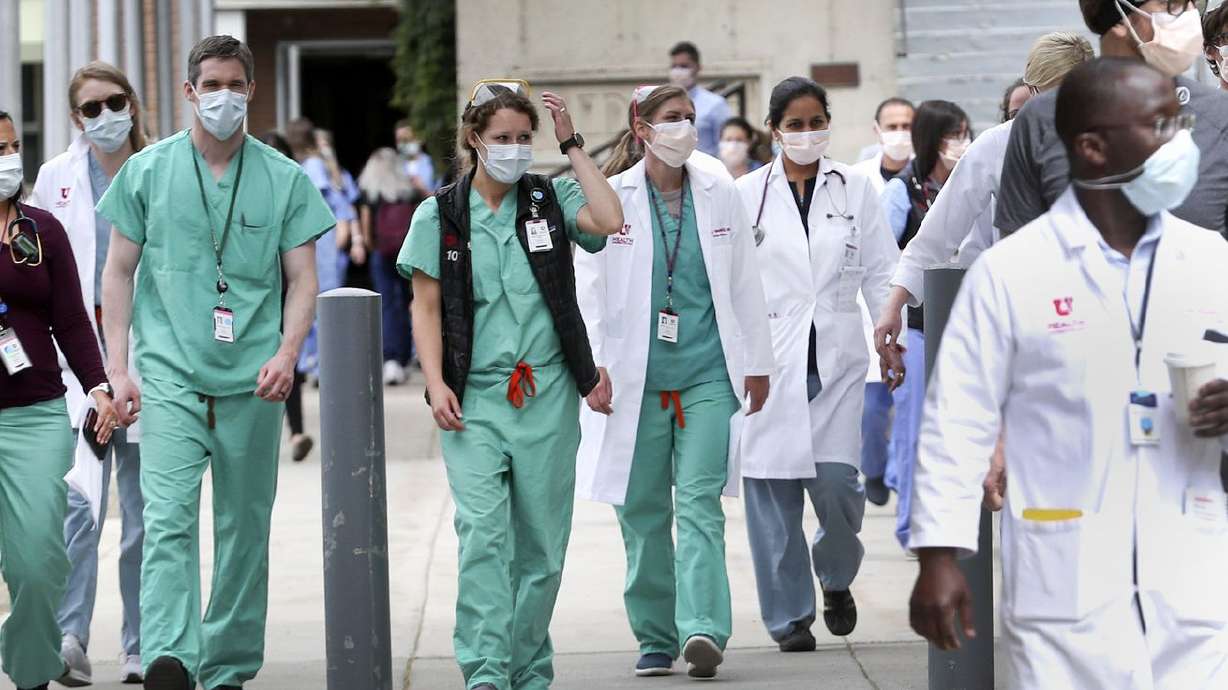Estimated read time: 4-5 minutes
This archived news story is available only for your personal, non-commercial use. Information in the story may be outdated or superseded by additional information. Reading or replaying the story in its archived form does not constitute a republication of the story.
SALT LAKE CITY — Still grappling with high rates of COVID-19 hospitalizations, health care workers around the country face a new challenge — growing concerns about violence and threats directed toward physicians, nurses and other staff.
After hearing from nurses and physicians about their concerns, Rep. Robert Spendlove, R-Sandy, introduced HB32, which he said would help protect health care workers in Utah.
The bill would make it a class A misdemeanor to assault or threaten violence against an owner, employee or contractor of a health care facility while working in the scope of their job. If an assault causes serious bodily injury, the perpetrator would be subject to a third-degree felony charge.
Those penalties are already in place for emergency room staff, but HB32 would expand them to cover all health workers — including those who work in private practice.
"We've got to do everything we can to recognize these heroes ... and give them not only financial support, but also moral and legal support," Spendlove said.
How common is violence toward health care workers?
Traditionally, emergency room staff have borne the brunt of violence — in part because federal law mandates that hospitals provide care to everyone seeking admittance to emergency rooms. Emergency rooms also see a high number of patients who are traumatized or under the influence of drugs — both of which can cause someone to be more likely to lash out.
Last September, the National Nurses United union released survey results that showed about 31% of hospital nurses reported they experienced a "small or significant" uptick in workplace violence — up from 22% in March.
Dave Gessel, executive vice president of the Utah Hospital Association, told the Deseret News that while nurses and physicians aren't facing threats or violence on a regular basis, it's important to stay ahead of the issue and send a message of support to workers.
"What's hard here is that we're not trying to say that hospitals are a very dangerous place ... when these are relatively isolated events," Gessel said. "On the other hand, it has added significantly to the stress and strain for hospital workers. It's harder for them to be resilient."
'We're having a health care crisis'
Violence is one of many factors impacting the health care profession, Spendlove said, and while his bill wouldn't fix all of them, he believes it would be a crucial step toward easing the burdens of nurses and physicians.
"One of the results of this is we're having a health care crisis in terms of staffing. The hospitals are losing many of these health care workers," he said.
"It's just been an onslaught," Gessel said, confirming that he, too, has seen a number of professionals leave the industry throughout the last year.
Other states have had similar concerns about staffing levels — and some have tried different methods to protect health care workers. Last May, Colorado Gov. Jared Polis, a Democrat, signed a bill that made "doxxing" — or revealing personal information such as address or phone number — a public health official or health care worker a misdemeanor.
Is COVID-19 to blame?
HB32 was recommended by the Health and Human Services Interim Committee, but not without some adjustments. Currently, the bill has a sunset date set for Jan. 1, 2027, when it will have to be renewed in order to stay in effect.
Spendlove said the clause was added at the behest of lawmakers who believe the spike in threats of violence is a product of the pandemic and are reluctant to increase criminal penalties permanently for an issue they hope will eventually resolve itself.
While it is unclear if things will return to "normal" once the pandemic is over, Spendlove said it would be relatively easy for the Legislature to renew the bill for as long as necessary.
"In general, in public policy, we don't want to have enhanced penalties for everything," he said. "We want to try to have the lightest touch with criminal penalties."
During the committee negotiations, Spendlove said he also received pushback from colleagues who wanted the bill to go further — which is in part why he expanded the language to cover private clinics and offices.
Having already tailored the legislation to meet demands from both camps, he is optimistic the bill will receive broad support and pass early on in the session.








